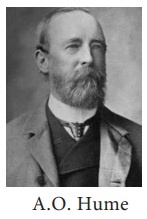Anti-Colonial Movements and the Birth of Nationalism | India - The Foundation of Indian National Congress (1870 – 1885) | 10th Social Science : History : Chapter 7 : Anti-Colonial Movements and the Birth of Nationalism
Chapter: 10th Social Science : History : Chapter 7 : Anti-Colonial Movements and the Birth of Nationalism
The Foundation of Indian National Congress (1870 – 1885)
The Foundation of Indian National
Congress (1870 – 1885)
(a) Rise of Nationalism
The
second half of the 19th century saw the emergence of national political
consciousness among a new social class of English educated Indians. The Indian
intelligentsia played a critical role in generating a national consciousness by
exposing a large number of people to the idea of nation, nationalism and
various democratic aspirations. The flourishing of print media both in the
vernacular and in English played a significant role in circulating such ideas.
Even
though they were numerically small they had a national character and capacity
to establish contacts on an all India scale. They were working as lawyers,
journalists, government employees, teachers or doctors. They took the
initiative to float political outfits, such as Madras Native Association (1852)
East India Association (1866), Madras Mahajana Sabha (1884), Poona Sarvajanik
Sabha (1870), The Bombay Presidency Association (1885) and many others.
(b) Economic Critique of Colonialism
One of
the most significant contributions of early Indian nationalists was the
formulation of an economic critique of colonialism.
Dadabhai
Naoroji, Justice Ranade, and Romesh Chandra Dutt, played a significant role in
making this criticism about colonial economy. They clearly understood that the
prosperity of the British lay in the economic and political subjugation of
India. They concluded that colonialism was the main obstacle to the Indian’s
economic development.
(c) Objectives and Methods
The formation
of the Indian National Congress in 1885 was intended to establish an all India organisation.
It was the culmination of attempts by groups of educated Indians politically active
in three presidencies: Bombay, Madras, and Calcutta. A.O. Hume lent his
services to facilitate the formation of the Congress. Womash Chandra Banarjee
was the first President (1885) Indian National Congress.

The first
session of the Indian National Congress was held on 28 December 1885. The early
objectives were to develop and consolidate sentiments of national unity; but
also professed loyalty to Britain. The techniques included appeals, petitions
and delegations to Britain, all done within a constitutional framework. Some of
the key demands were the following:
• creation of legislative councils at provincial
and central level
• increasing the number of elected members in the
legislative council
• separating
judicial and executive functions „ reducing military expenditure
• reduction
of Home Charges
• extension of trial by jury
• holding civil services exams in India as well as
in England.
• police reforms
• reconsideration of forest laws
• promotion of Indian industries and an end to
unfair tariffs and excise duties.
(d) Militant Nationalism
The
methods of moderate leaders failed to yield any substantive change in the
British attitude towards the moderate demands of early Indian nationalists.
They were criticised by a group of leaders known as “extremists”. Instead of
prayers and petitions, these militants were more focused on self-help.
Related Topics